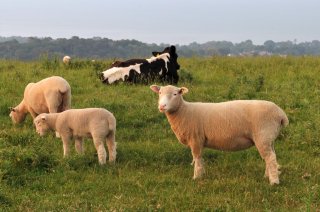 Sara Price from Pixabay" fetchpriority="AUTO">
Sara Price from Pixabay" fetchpriority="AUTO">
Multi-partner Call
Mitigation of agricultural greenhouse gases
Climate change is a global problem which can only be tackled with an international approach. Being responsible for between 19% and 29% of all GHG emissions, the agricultural sector has many opportunities to contribute to emission reductions and carbon sequestration while still helping meet food security objectives. In order to develop more efficient and productive agricultural systems, there is a need to increase research cooperation and investment in mitigation practices and technologies. The challenge of reducing greenhouse gas (GHG) emissions from agriculture requires a global strategic approach and cooperation between national research programmes.
To this end, FACCE-JPI launched in January 2013 an international multi-partner call on agricultural greenhouse gas research, bringing together 11 FACCE-JPI partner countries as well as Canada (Agri-Food, New Zealand (Ministry for Primary Industries and Agriculture and Agri-Food) and the United States (American National Institute of Food and Agriculture of the USDA). It mixed in-kind and in-cash contributions with a total budget of approximately 9.9 million Euros. The overall success rate of pre-proposal submission (based on the Letters of Intent) was 31%, and the success rate based on the full proposals of 48%.
Research proposals were evaluated in a two-step process (eligibility according to national funding rules, and scientific evaluation by an International Evaluation Committee (IEC) consisting of 8 independant expert scientists. Out of 36 pre-proposals received in March 2013, 30 projects were invited to submit full proposals. 23 were received, from which 11 projects were selected for final funding. The overall success rate of pre-proposal submission (based on the Letters of Intent) was 31%, and the success rate based on the full proposals of 48%.
The call brought together excellent research consortia and enhanced international collaboration in the face of the global issue of climate change mitigation. The research undertaken contributed in improving the measurement of greenhouse gas emissions and carbon sequestration in soil in different agricultural systems as well as to propose, test and verify new practices, strategies and solutions to sustainably increase the carbon sequestration potentials of agricultural soils. Furthermore, it facilitated the transfer of knowledge to farmers to enable them to be the lead actors in the reduction of greenhouse gas emissions in the agricultural sector. Find out more about the projects:
- CN-MIP: C and N Models Intercomparison and Improvement to assess management options for GHG mitigation in agrosystems worldwide (coordinated by INRA, France, with 10 other partners)
- COMET-Global: COMET-Global: Whole-farm GHG estimation and environmental diagnostics platform (coordinated by the Colorado State University, USA, with 6 partners)
- Designchar4food: Enhancing both soil carbon sequestration and fertility while reducing soil greenhouse gas emissions through designer biochar application (coordinated by the United States Department of Agriculture-Agriculture Research Service with 5 other partners)
- EndoGas: Manipulating Grass - Fungal Endophyte Symbioses to Reduce Greenhouse Gas Emissions and Increase Soil Carbon - Sequestration in Grasslands of Finland, Spain, and the United States (coordinated by the University of Kentucky, USA, with 2 other partners)
- Global Network: Global network for the development and maintenance of nutrition-related strategies for mitigation of methane and nitrous oxide emissions from ruminant livestock (coordinated by Pennsylvania State University with 5 other partners)
- GreenRice: Greenhouse gas emissions from paddy rice soils under alternative irrigation management (coordinated by Ghent University, Belgium, with 3 other partners)
- IdenWays: Identifying ways to reduce agricultural GHG emissions: A multinational modeling approach to optimize C and N cycles between livestock and cropping systems (coordinated by the University of New Hampshire, USA, with 5 other partners)
- I.N.C.O.M.E: Increasing Adoption of Mitigation Options to Minimise Agricultural GHG Emissions (coordinated by Landcare, New Zealand, with 3 other partners)
- MAGGNET: Quantifying Greenhouse Gas Mitigation Effectiveness through the GRA Croplands Greenhouse Gas Network (cordinated by the USDA Agricultural Research Service, USA, with 6 other partners)
- Models4Pastures: Robust models for assessing the effectiveness of technologies and managements to reduce N2O emissions from grazed pastures (coordinated by AgResearch Limited, New Zealand, with 5 other partners)
- RumenStability: Understanding the development and control of stability in the rumen microbiome as a basis for new strategies to reduce methanogenesis (coordinated by TEAGASC, Ireland, and including 8 other partners).